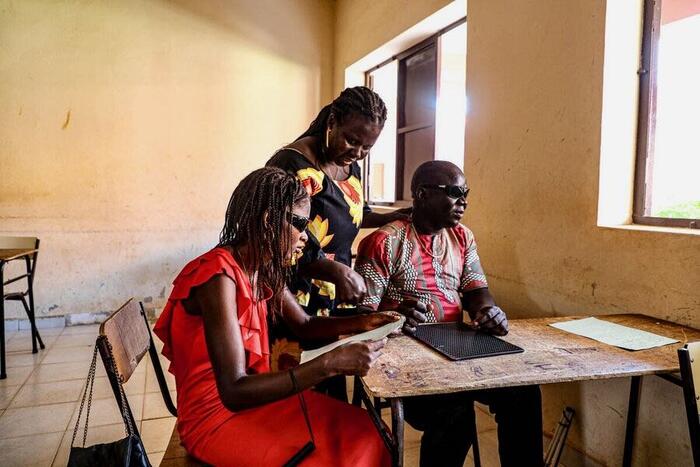WFP and partners are supporting a West African country to integrate children with disabilities into the public school system.
December 1, 2023, Charlotte Alves, Richard Mboue, Marianela Gonzalez
Adama Balde greets the bell signaling breakfast with a smile.
The 14-year-old blind girl uses a cane to make her way to the school cafeteria behind Bengarablanca School in Guinea-Bissau’s capital, where she is served a piping hot dish of rice and sauce.
“This food gives me energy and helps me concentrate in class,” Adama says, sitting on a concrete bench and sipping his meal.
Bengala Branca, which translates to “white cane” in Portuguese, the official language of this West African country, is the country’s first inclusive school, where children with and without disabilities attend together.
The boarding school is part of a wider effort by the World Food Programme (WFP), the government of Guinea-Bissau and the international non-governmental organisation Humanity and Inclusion to provide nutritious WFP school meals and to make the public school system more accessible to children with disabilities.
In the process, the Education Without Borders project aims to address the deep-rooted prejudices and unequal treatment against children with disabilities in Guinea-Bissau and other parts of the region, which often deny them opportunities to become healthy and successful adults.
“They don’t let you go to school, they don’t take you to the hospital because you’re born with a disability,” says Lázaro Barbosa, president of the Guinea-Bissau Federation of Associations for the Protection and Promotion of Disabled People, which works with WFP to better identify and integrate children with disabilities in schools.
Barbosa and other researchers say some parents believe having a disabled child is linked to a curse or witchcraft, so they try to hide the child or abandon them.
“My parents thought I was a devil and didn’t want the villagers to mock me,” says one of the sixth-graders in the program, whose identity is being withheld for his protection. “But now I want to make my parents proud because I’m going to be a French teacher soon.”
A school for all ages
Guinea-Bissau is not the only country where WFP works with partners to get people with disabilities of all ages back to school thanks to nutritious meals: in Venezuela, for example, WFP’s school feeding programme, launched last year, now reaches more than 15,000 children, adolescents, adults and their families in 300 schools across eight states.
Among them is Luis Enrique, 52, who has a cognitive impairment and is attending school for the first time.
“Some people say it’s too late, but I don’t think so,” said his father and caregiver, Luis Garcia, 72. “I think he’ll be fine when I’m gone.”
In Guinea-Bissau, around 16 percent of children between the ages of 5 and 17 live with some form of disability, and their access to health care, education, social assistance and other services is severely limited.
A World Bank study of these and other barriers faced by people with disabilities in 10 sub-Saharan African countries concludes that getting a quality education for children is even more crucial.
“We don’t want to leave any child behind in the education system or without access to healthy nutrition,” said Claude Kakuré, WFP Representative and Country Director in Guinea-Bissau. “We believe that children with disabilities have potential – they just need the right support.”
Launched in 2020, the Education Without Borders project has now spread to all 852 schools in Guinea-Bissau covered by WFP’s school feeding programme. We and our partners are now trying to map children with disabilities across the country to better identify and support them, and are also exploring other ways to better support inclusive education.
WFP also worked with partners and the Guinea-Bissau Ministry of Education to establish a special government office for inclusive education, with staff learning first-hand from a similar effort in Burkina Faso.
“This experience made us realise the need to establish special education programmes for people with disabilities in the country,” said Manuel Malam Jafono, director-general of the newly created Directorate General of Inclusive Education.
Under the leadership of the Barbosa Federation, WFP also participates in efforts to strengthen the capacity of civil society organizations and other organisations that advocate for the right to education and other fundamental rights of children with disabilities.
“These children have a right to education so they can contribute to the development of their country,” Barbosa said, adding that the organization plans to launch an awareness campaign to encourage more parents to send their children with disabilities to school.
Food Assistance Center
For young people and their parents, WFP’s food assistance is central to this goal, including take-home rations for learners with disabilities that act as a buffer against hunger, and initial cash assistance to particularly vulnerable families.
“If this program ever ends, it will be another abandonment for these children who are already hurting in life,” said Aissatou Jaro, a blind teacher assistant for visually impaired students at Bengalablanca School, who herself graduated from the school with a university degree.
At Mariposa, another school in the capital, Bissau, which provides education for learners with hearing and speech impairments, WFP is training young students to set up a school garden. The fruits and vegetables harvested will enhance the nutritional value of school meals, supporting the government’s wider efforts to introduce health and nutrition programmes in schools.
“Before, students would drop out of school to go to work and not be able to support themselves,” says Mariposa Principal Amare Soares, “but now, thanks to this program, in addition to the skills training they receive at school, they know how to create and maintain vegetable gardens to feed themselves.”

